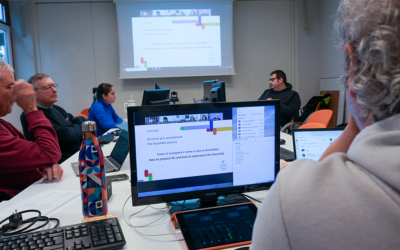We always have only one moment in which to love God and our brothers or sisters: the present moment. Chiara Lubich taught this concept with wisdom and simplicity. Committing ourselves to living the present moment well is a method whereby each of us can be fulfilled and achieve happiness. There are, even among us, those who finish their Holy Journey after a long wait and those who finish it in a flash, when they least expect it. And so the question arises: what will it be like for us? And the conclusion comes naturally: it is good to always be prepared. In what way? By remaining in the grace of God and living the present moment to the full. It was for this reason […] that in these last few days I focused my attention once again on that very characteristic aspect of our spirituality that consists in concentrating on living the present moment. And my thoughts turned to so many phrases taken from the saints, for example, that encourage us to put this into practice perfectly. Do you remember? St. Catherine of Siena said: “We do not possess the toil of the past, because that time has escaped us; nor the toil that is to come, because we cannot be certain of having that time.”[1] By saying this, she extended an invitation to live the present. And St. Therese of Lisieux: “You know, my God, that to love You… I only have today.”[2] Then I remembered a motto that was useful to us in the past and which we remembered very easily because each word [in Italian] began with an “s”: Sarò Santa se Sono Santa subito, (I will become a saint if I am a saint straightaway). During these few days I have often noticed that this way of living our life was precious also to other saints who recommended it warmly. St. Paul of the Cross wrote “Fortunate is the soul which rests ‘in sinu Dei,’ without thinking of the future, but manages to live moment by moment in God, with no other concern than to do his will well in all that happens.”[3] “Fortunate is that soul…” We can make this fortune our own, because it is part of our spirituality to live like this. It is by living in the present that we can fulfil all our duties well. It is by living in the present that crosses become bearable: with good reason this practice is recommended for those who are nearing death. It is by living in the present that we can grasp God’s inspirations, the impulses of his grace that come to us in the present. […] So let’s live the present moment! […] Let us live it to perfection! In the evening of each day and in the evening of life we will find ourselves full of good works that have been accomplished and acts of love offered. …
Chiara Lubich
(Taken from a telephone Conference Call, Rocca di Papa, 23 October 1986) [1] St Catherine of Siena, Her Letters, II, Paoline, Alba 1966, p. 97. [2] St. Therese of the Child Jesus, Complete Works, LEV, Vatican City 1997, p. 626. [3] Paul of the Cross, Letters, I, Pontifical Institute of Pius IX




0 Comments